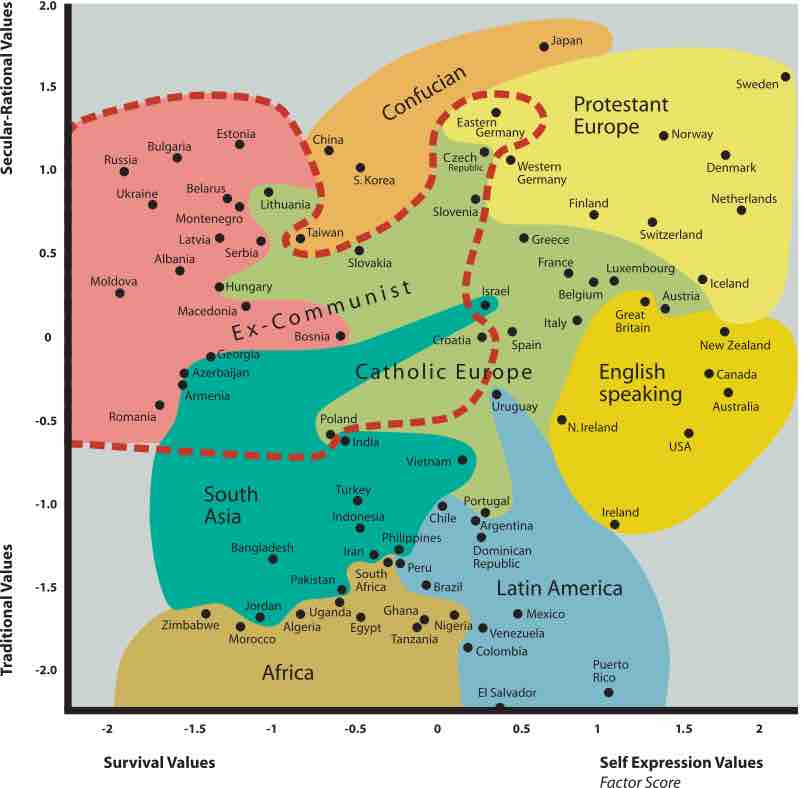Value Theory
Value theory encompasses a range of approaches to understanding how, why and to what degree people value things, whether the thing is a person, idea, object, or anything else. This investigation began in ancient philosophy, where it is called axiology or ethics. Early philosophical investigations sought to understand good and evil and the concept of "the good". Today much of value theory is scientifically empirical, recording what people do value and attempting to understand why they value these things in the context of psychology, sociology, and economics.
A personal or cultural value is an extremely absolute or relative ethical value, the assumption of which can be the basis for ethical action. A value system is a set of consistent values and measures. A principle value is a foundation upon which other values and measures of integrity are based. Those values which are not physiologically determined and normally considered objective, such as a desire to avoid physical pain, seek pleasure, etc., are considered subjective. This means they vary across individuals and cultures and are in many ways aligned with belief and belief systems. Types of values include ethical/moral values, doctrinal/ideological (religious, political) values, social values, and aesthetic values. It is debated whether some values which are not clearly physiologically determined, such as altruism, are intrinsic, and whether others, such as acquisitiveness, should be valued as vices or virtues. Values can be defined as broad preferences concerning appropriate courses of action or outcomes. As such, values reflect a person's sense of right and wrong or what "ought" to be. "Equal rights for all", "Excellence deserves admiration", and "People should be treated with respect and dignity" are representative of values.
Personal values
Personal Values provide an internal reference for what is good, beneficial, important, useful, beautiful, desirable, constructive, etc. Values generate behavior and help solve common human problems for survival by comparative rankings of value, the results of which provide answers to questions of why people do what they do and in what order they choose to do them. Over time the public expression of personal values, that groups of people find important in their day-to-day lives, lay the foundations of law, custom and tradition. Personal Values in this way exist in relation to cultural values, either in agreement with or divergent from prevailing norms. A culture is a social system that shares a set of common values, in which such values permit social expectations and collective understandings of the good, beautiful, constructive, etc. Without normative personal values, there would be no cultural reference against which to measure the virtue of individual values and so culture identity would disintegrate.
Cultural Values
The Inglehart-Welzel Cultural Map of the World , created by sociopolitical scientists, Ronald Inglehart and Christian Welzel, is based on the World Values Survey. Cultures have values that are largely shared by their members. The values of a society can often be identified by noting which people receive honor or respect. In the US, for example, professional athletes at the top levels in some sports are honored (in the form of monetary payment) more than college professors. Surveys show that voters in the United States would be reluctant to elect an atheist as a president, suggesting that belief in God is a value. Values are related to the norms of a culture, but they are more global and abstract than norms. Norms are rules for behavior in specific situations, while values identify what should be judged as good or evil. Flying the national flag on a holiday is a norm, but it reflects the value of patriotism. Wearing dark clothing and appearing solemn are normative behaviors at a funeral. In certain cultures they reflect the values of respect and support of friends and family. Different cultures reflect different values.

The Inglehart-Welzel Cultural Map of the World
The Inglehart-Welzel Cultural Map of the World, created by sociopolitical scientists Ronald Inglehart and Christian Welzel based on the World Values Survey.
"Over the last three decades, traditional-age college students have shown an increased interest in personal well-being and a decreased interest in the welfare of others. " Values seemed to have changed, affecting the beliefs, and attitudes of college students. Members take part in a culture even if each member's personal values do not entirely agree with some of the normative values sanctioned in the culture. This reflects an individual's ability to synthesize and extract aspects valuable to them from the multiple subcultures they belong to. If a group member expresses a value that is in serious conflict with the group's norms, the group's authority may carry out various ways of encouraging conformity or stigmatizing the non-conforming behavior of its members.